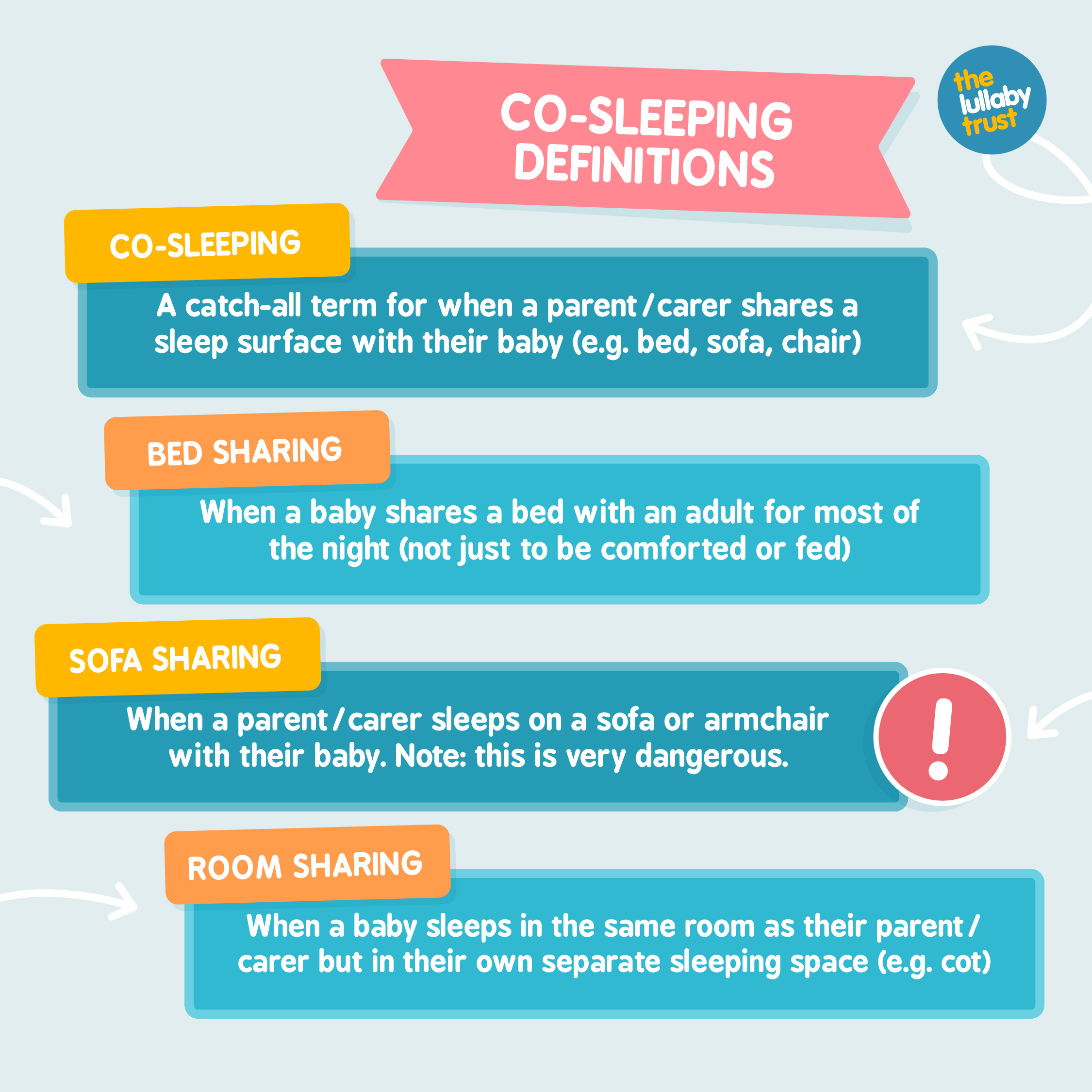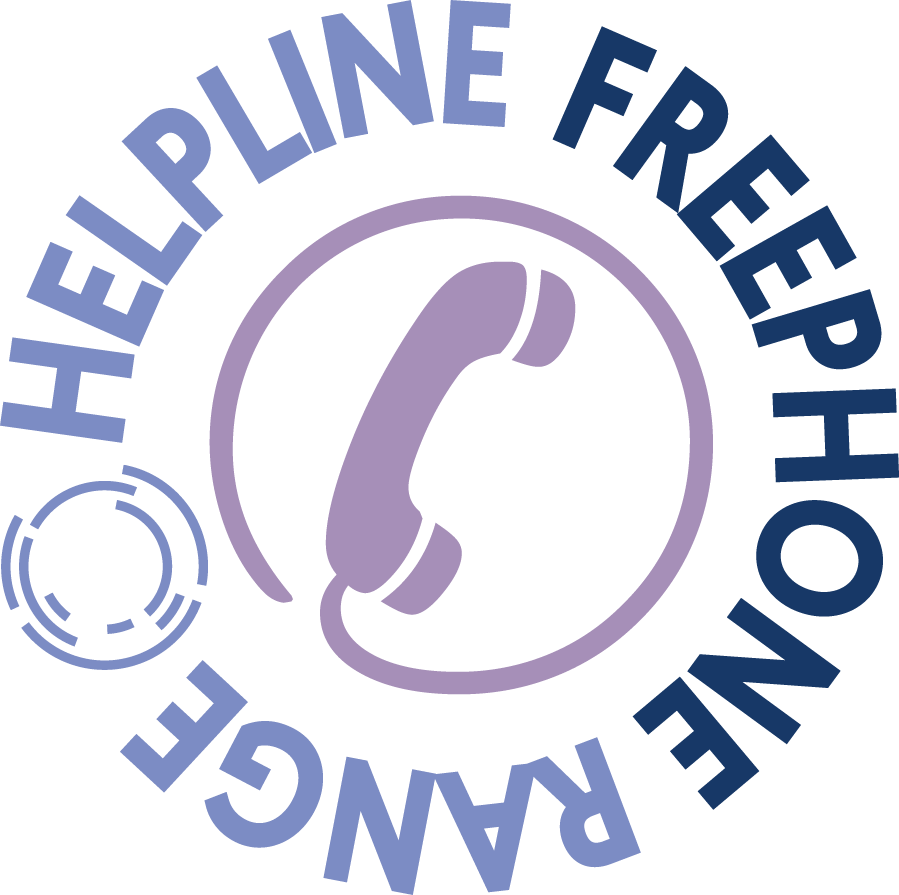To reduce the risk of sudden infant death syndrome (SIDS) the safest place for a baby to sleep is in their own clear, flat, separate sleep space, such as a cot or Moses basket. However, we know that many parents find themselves co-sleeping whether they mean to or not. Wherever you’re planning for your baby to sleep we recommend making your bed a safer place for baby. Our advice on co-sleeping with your baby will tell you how.
When not to co-sleep
Whether you choose to co-sleep or it is unplanned, there are some key risks you should avoid.
Co-sleeping with your baby is very dangerous if:
- you or anyone in the bed has recently drunk any alcohol
- you or anyone in the bed smokes or the baby was exposed to smoking in pregnancy
- you or anyone in the bed has taken any drugs or medication that make you feel sleepy
- your baby was born prematurely (before 37 weeks of pregnancy) or weighed under 2.5kg or 5½ lbs when they were born.
In these scenarios, it is always best to put baby in their own safe sleep space, such as a cot or Moses basket. Keeping the cot or Moses basket next to your bed might make this easier.
Never fall asleep on a sofa or armchair with your baby. The risk of SIDS is 50 times higher for babies when they sleep on a sofa or armchair with an adult. They are also at risk of accidental death as they can easily slip into a position where they are trapped and can’t breathe.
Co-sleeping more safely
Adult beds have not been designed or safety tested for infant sleep in the same way as, for example, a cot or Moses basket. Whether you choose to bedshare, or it is unplanned, it is best to think ahead.
- Keep pillows and adult bedding away from your baby or any other items that could cover their head or cause them to overheat. A high proportion of babies who die as a result of SIDS are found with their head covered by loose bedding.
- Remove slatted / decorated headboards.
- Follow all The Lullaby Trust’s other safer sleep advice to reduce the risk of SIDS such as sleeping baby on their back.
- Do not bring other children or pets into bed with you. This will help to reduce the risk of accidents.
- Check that baby cannot be trapped in the bedframe or headboard, wedged or fall out of bed or get trapped between the mattress and the wall.
- Never leave your baby alone in an adult bed. It’s important to consider any risks that an adult bed may post to your baby, especially while you are asleep. As your baby develops, becomes more mobile and can move around, the risks can change, so we recommend checking your bed regularly to prevent possible accidents.

If you are bedsharing with your baby you should consider any risks before every sleep. It is easy for your situation to change if you are unwell or have drunk any alcohol, which means your baby will be safest in a separate sleep space such as a cot or Moses basket on that occasion.
For more info on co-sleeping and safer sleep read our guide for parents
Sharing a room
Babies should always be in the same room as you for at least the first six months for sleep, day and night. This doesn’t mean you can’t leave the room to make a cup of tea or go to the toilet, but for most of the time when they are sleeping they are safest if you are close by.
There are no devices on the market that will substitute a parent or carer being in the same room as baby for safer sleep.
Co-sleeping definitions





Co-sleeping with your baby: FAQs
I am worried I might fall asleep while I breastfeed my baby at night, is this ok?
Click here to open this question
Breastfeeding reduces the chance of SIDS. If you feel you might fall asleep we would recommend you prepare the bed as described above so it is safer for baby if this happens.
Make sure you know the advice on when never to co-sleep so you know when to take particular care. It is really important that you do not accidentally fall asleep with your baby on a sofa or armchair. If you think you might fall asleep on a sofa or armchair, put the baby down in a safe place to sleep.
Should I co-sleep with my baby?
Click here to open this question
The safest place for a baby is their own separate sleep space, such as a cot or Moses basket. We would just advise you to read all the information on co-sleeping and how to reduce the risks, so you can make an informed decision for you and your baby.
However, there are some circumstances where we would strongly recommend against co-sleeping such as on a sofa or armchair, if anyone in the bed smokes or has drunk alcohol or your baby was premature or a low birth weight.
Can I co-sleep with twins or multiples?
Click here to open this question
If you choose to bedshare with twins or multiples we would advise not to bedshare with more than one baby at a time due to risk of accidents associated with bedsharing with more than one baby or child.
Is it safer to co-sleep using a nest or pod than with a baby just lying on the adult bed?
Click here to open this question
No. We do not recommend that babies sleep on soft surfaces such as pods or nests. If you choose to co-sleep with your baby the safest place is a clear space on a firm flat mattress the same as we would advise with a cot.
Why do you advise against co-sleeping in certain scenarios?
Click here to open this question
It is estimated that around half of SIDS deaths occur whilst co-sleeping, and that most of these are in high risk situations. We do not know the cause of SIDS and why these deaths happen but we do know what some of the risk factors are and that removing those risks greatly lowers the chance of SIDS occurring.
For that reason we strongly advise against co-sleeping when there are risk factors such as a baby being premature or a parent having drunk alcohol.
What bedding should I use for my baby when we co-sleep?
Click here to open this question
Adult bedding should be kept well away from your baby along with any belts or cords from clothing. Keep adult bedding at your waist height and add an extra layer of clothing if you are cold
A baby sleeping bag is a good way of giving your baby their own bedding when bedsharing.
Baby sleeping bags should be well fitted, so the baby can’t wriggle down inside. Most sleeping bags are fitted according to a baby’s weight, rather than age.
The Lullaby Trust has worked with Public Heath England, Unicef UK Baby Friendly and Basis on two publications to support families with safer sleep advice and advice on co-sleeping more safely. We have also collaborated on a guide for health professionals to have more open and productive discussions with families about safer sleep and co-sleeping. These can be downloaded below.
You might also be interested in reading the two Unicef Baby Friendly publications, which are both endorsed by The Lullaby Trust:
- Unicef’s leaflet on Caring for Your Baby at Night
- Unicef’s guide Co-sleeping and SIDS: A Guide for Health Professionals

